Alpine Alpenglow Hy6 Supercar – 3500 CC, 740 HP, Top speed 205 mph (330 kmph). The Evolution of a Stunning Hydrogen Engine V6 Concept Race Car
Alpine Alpenglow: Introduction to the Hy6
The Alpine Alpenglow Hy6 supercar marks a significant evolution in the world of hydrogen-powered vehicles. Building on the foundation set by its predecessor, the Hy4, (Alpine Alpenglow HY4) the Hy6 showcases Alpine’s commitment to sustainable performance while delivering exhilarating driving dynamics. This stunning concept car integrates advanced hydrogen technology with a powerful V6 engine, setting new standards for performance and efficiency in motorsport and beyond.
Hydrogen Technology and Hydrogen Engine H2ICE Design:
The two primary technologies for hydrogen-powered propulsion are hydrogen fuel cells vehicles (HFCV or FCEV), which generate electricity to drive an electric motor, and hydrogen internal combustion engines (H2ICE), which use hydrogen as a direct fuel source for power generation.
At the heart of the Hy6, super car is its innovative hydrogen internal combustion engine (H2 ICE). This engine represents a leap forward in hydrogen technology:
- Hydrogen Engine Specifications: The Hy6 is equipped with a 3.5-liter twin-turbocharged V6 engine that produces an impressive 740 hp (544 kW) at 7,600 rpm and 568 lb-ft (770 Nm) of torque at 5,000 rpm. This marks a substantial increase in power compared to the Hy4’s 340 hp output.
- Hydrogen Storage Tank: Compressed gaseous hydrogen (GH2): The vehicle features three hydrogen tanks, each capable of storing 2.1 kg of hydrogen at high pressures of 700 bar. These tanks are strategically positioned in ventilated compartments within the side pods and behind the cockpit, ensuring safety and optimal weight distribution.
- Hydrogen Combustion Process: The hydrogen engine utilizes direct injection technology for hydrogen, allowing for precise control over the air-fuel mixture. A water injection system further enhances combustion efficiency and reduces NOx emissions by moderating combustion temperatures.
Alpine Alpenglow Supercar: Design Innovations
The design of the Alpine Alpenglow Hy6 race car is not only visually striking but also functionally optimized for performance:
- Aerodynamic Features: The car’s design incorporates advanced aerodynamics with a sleek profile that minimizes drag. The transparent rear bonnet showcases the intricate engineering beneath while contributing to weight reduction.
- Chassis Construction: Built on an LMP3 carbon chassis, the Hy6 combines lightweight materials with structural integrity, ensuring high performance on both track and road.
- Visual Identity: The exterior features bold lines and distinctive color accents that reflect Alpine’s racing heritage, while also highlighting its commitment to sustainability through hydrogen technology.
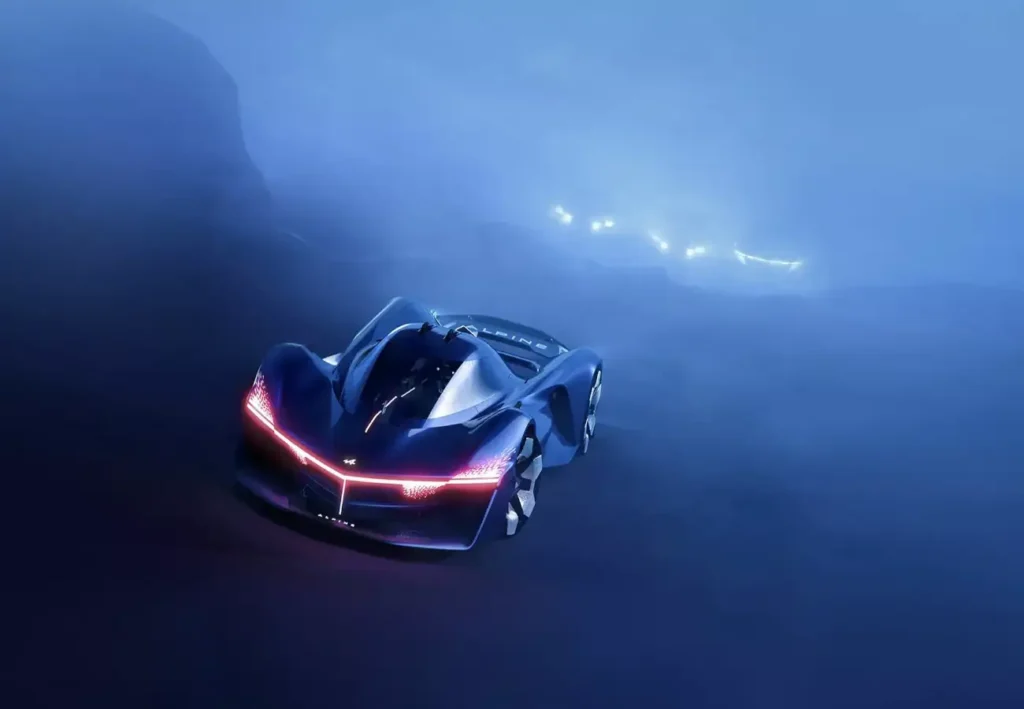
Efficiency Improvements
The Alpine Alpenglow Hy6 hydrogen engine car demonstrates remarkable efficiency metrics that enhance its appeal as a performance vehicle:
- Performance on Track: The vehicle is designed to achieve approximately 100 km (62 miles) of running on track without refueling, showcasing hydrogen’s practicality as a fuel source for high-performance applications.
- Engine Efficiency: With advancements in combustion chamber design and air loop optimization, the Hy6 operates efficiently under heavy loads while minimizing emissions.
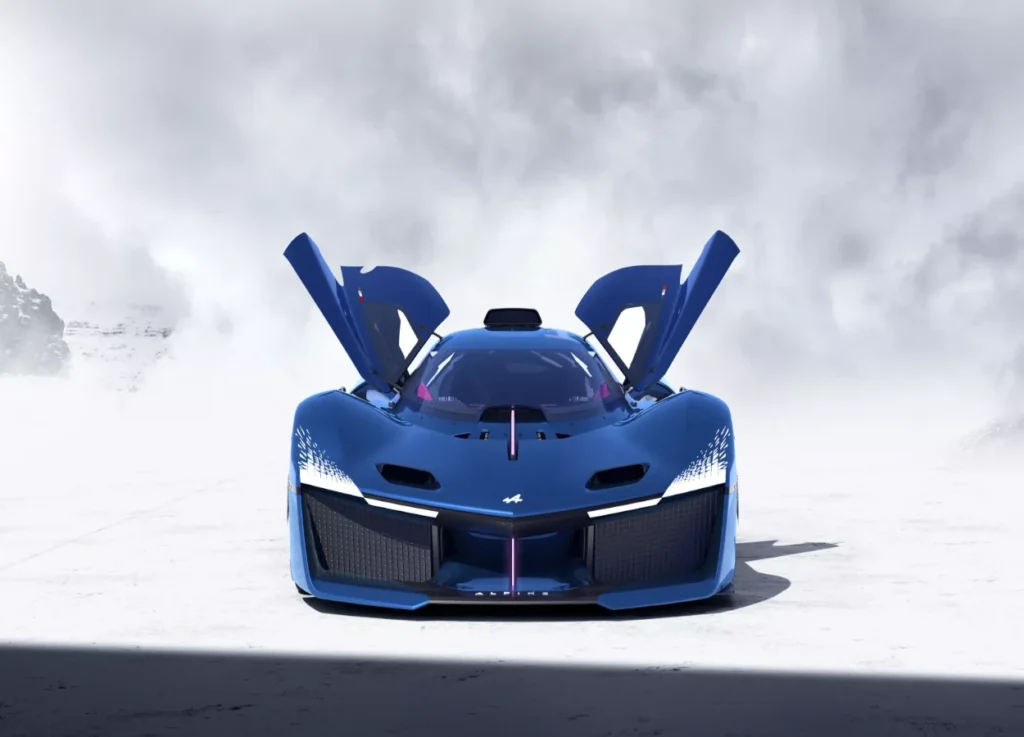
Alpine Alpenglow Hy4 and Hy6 differences
The Alpine Alpenglow Hy4 and Hy6 represent two significant milestones in Alpine’s exploration of hydrogen technology for high-performance vehicles. Here’s a detailed comparison of the main differences between the two models based on the latest research and information.
| Aspect | Alpenglow Hy4 | Alpenglow Hy6 |
|---|---|---|
| Engine Type | 2.0-liter turbocharged inline-four hydrogen engine | 3.5-liter twin-turbocharged V6 hydrogen engine |
| Power Output | 340 hp (250 kW) | 740 hp (544 kW) |
| Torque | Not specified | 568 lb-ft (770 Nm) |
| Maximum RPM | Not specified | 7,600 rpm (redline at 9,000 rpm) |
| Hydrogen Storage Capacity | Approximately 6 kg (two tanks) | 2.1 kg per tank (three tanks total, 6.3 kg total) |
| Hydrogen Storage Pressure | 700 bar | 700 bar |
| Driving Range | Approximately 100 km (62 miles) on track | Approximately 100 km (62 miles) on track |
| Refueling Time | Approximately 5 minutes | Approximately 5 minutes |
| Chassis Design | LMP3 carbon chassis | LMP3 carbon chassis |
| Aerodynamics | Standard aerodynamic features | Enhanced aerodynamics with a transparent rear wing and shark fin |
| Safety Features | Basic safety features | Advanced safety features, including ventilated sealed compartments for hydrogen tanks |
| Water Injection System | Not specified | Indirect water injection system to stabilize combustion and reduce NOx emissions |
| Design Philosophy | Focused on performance with racing heritage | Combines aesthetics and mechanics with a focus on sustainability and performance |
| Market Positioning | Concept for sustainable performance | Prototype aimed at motorsport applications |
| Availability Timeline | Concept showcased in 2022 | Showcased at the Paris Motor Show in October 2024; potential road-legal version in late 2025 or early 2026 |
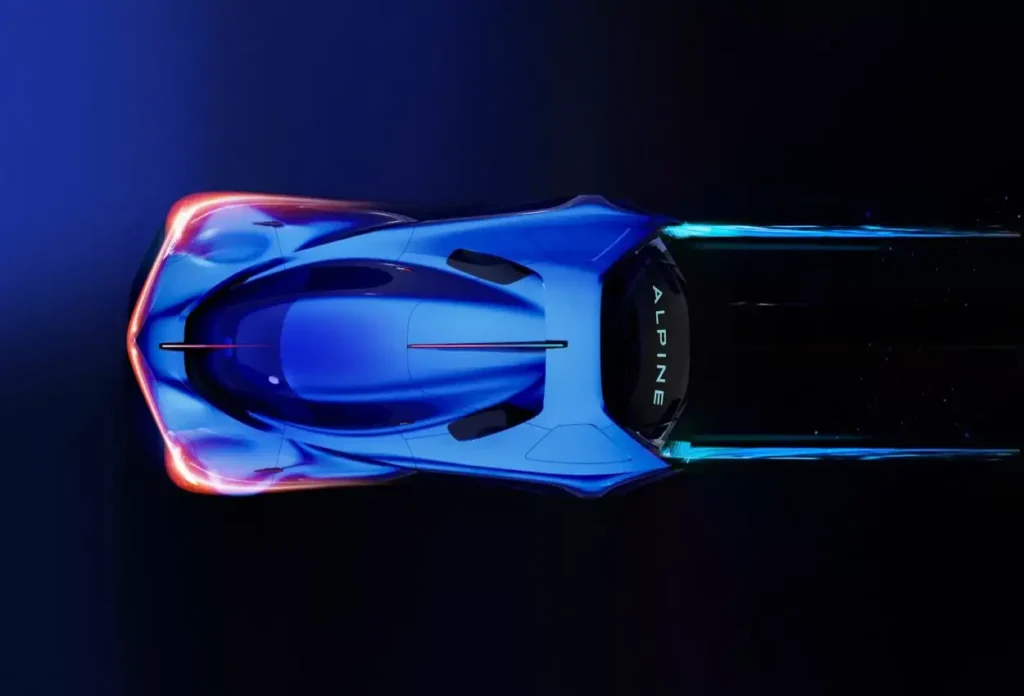
Alpine Alpenglow: Safety Features
Safety remains a top priority for Alpine in developing the Hy6 super car:
- Safety Engineering: The hydrogen tanks are housed in sealed compartments separate from the passenger area, equipped with rapid-release valves for quick evacuation in case of emergencies.
- Crash Safety Design: The updated crash structure has been engineered to absorb impact energy effectively, ensuring driver safety during high-speed racing scenarios.
Alpine Alpenglow Supercar: Overview
Here are some key specifications for the Alpine Alpenglow Hy6:
| Specification | Details |
|---|---|
| Engine | 3.5-liter twin-turbocharged V6, 3500 CC |
| Power Output | 740 hp (544 kW) |
| Maximum Torque | 568 lb-ft (770 Nm) |
| Hydrogen Storage | Three tanks of 2.1 kg each at 700 bar |
| Driving Range | Approximately 100 km (62 miles) on track |
| Refueling Time | Rapid refueling capability |
| Emissions | Reduced NOx emissions via water injection |
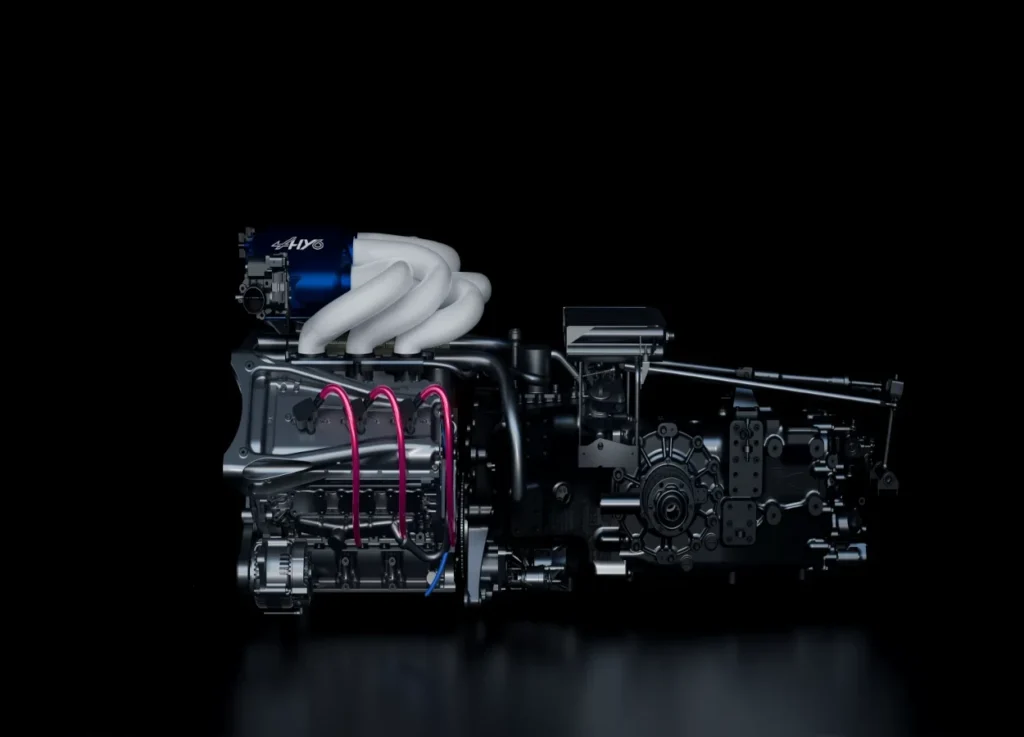
Alpine Alpenglow Hy6 Race Car – Hydrogen internal combustion engine (H2ICE) specifications:
- Width 2.10 m, length 5.20 m, height 1.14 m
- Fuel cells: 3 x 2.1 kg under 700 bars
- Architecture: 6-cylinder 100° V-twin turbocharged engine
- Displacement: 3500 cc
- Bore x stroke: 95 mm x 82,3 mm
- Timing: 4 chain-driven overhead camshafts, 4 valves per cylinder controlled by finger cogs
- Fuel delivery: hydrogen direct injection + water indirect injection
- Maximum power: 740 bhp (544 kW) at 7,600 rpm (211 bhp/l)
- Maximum torque: 770 Nm at 5,000 rpm (220 Nm/l)
- Maximum rpm: 9,000
- Gearbox: 6-speed sequential
- Transmission: rear-wheel drive
- Maximum speed: over 330 km/h
Formula 1-inspired engine development has fine-tuned this Alpine Alpenglow Hy6 Race Car‘s hydrogen-powered engine for optimal performance. The combustion chamber, designed for dihydrogen (H₂), promotes turbulent mixing for a uniform air-fuel mixture before ignition. Hydrogen’s broad flammability range requires precise control to prevent issues like pre-ignition (spontaneous combustion before sparking) or knocking (shock waves from auto-ignition). Advanced fuel injection, combined with indirect water injection, reduces NOx emissions and minimizes abnormal combustion risks.
Availability and Pricing
The Alpine Alpenglow Hy6 supercar was showcased at the 2024 Paris Motor Show, highlighting its readiness for future motorsport applications. While specific pricing details have yet to be announced, it is anticipated that this advanced concept will pave the way for production models expected in late 2025 or early 2026, aligning with Alpine’s vision for sustainable performance vehicles.
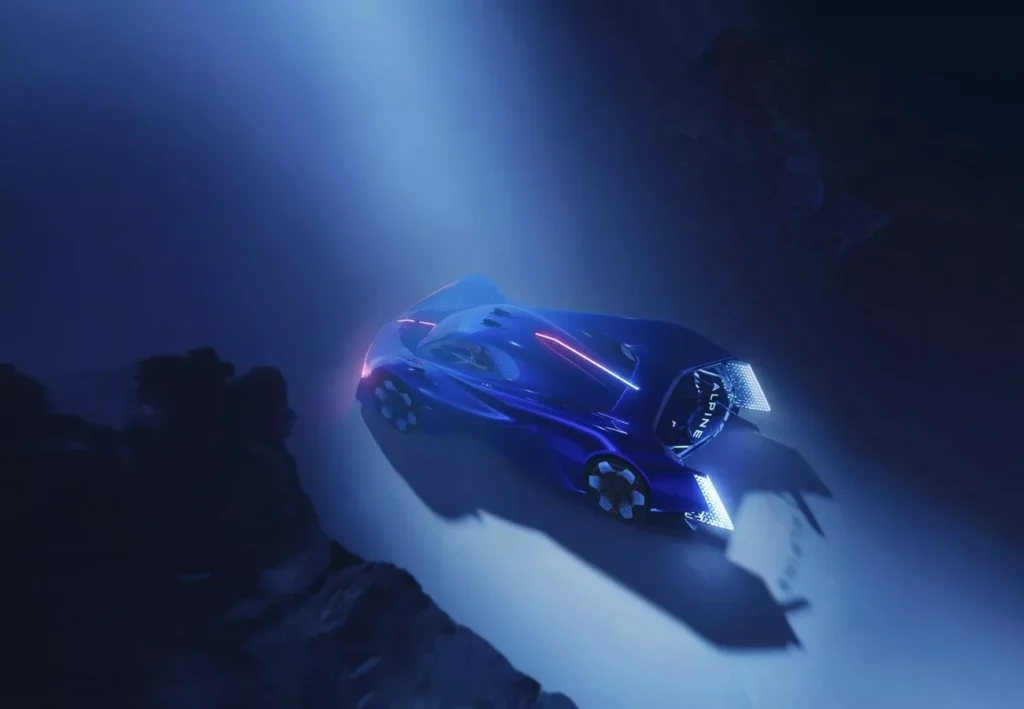
Renault Group’s Commitment to Hydrogen Mobility: Driving Carbon Neutrality Goals
Renault Group embraces hydrogen technology with complementary solutions, advancing its mission for carbon neutrality in Europe by 2040 and globally by 2050. Hydrogen innovations play a pivotal role in achieving sustainable mobility and reducing emissions across its operations.
Conclusion
The supercar, Alpine Alpenglow Hy6 stands as a testament to innovation in hydrogen internal combustion engine (H2ICE) technology and automotive design. With its powerful engine, advanced safety features, and commitment to sustainability, this concept car sets a new benchmark for performance in motorsport. As Alpine continues to develop this exciting technology, it promises to redefine what is possible in the realm of high-performance vehicles powered by hydrogen.
Source: https://www.alpine-cars.co.uk/concept-cars/alpenglow.html
This content is protected by copyright and cannot be reused without permission. For collaboration inquiries or to request content usage rights, please get in touch with us: info@thehydrogen.energy
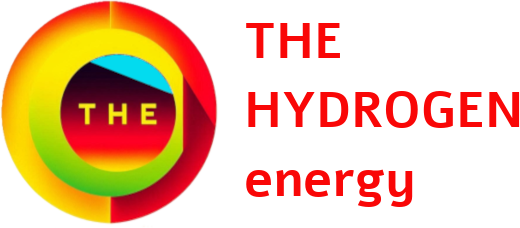

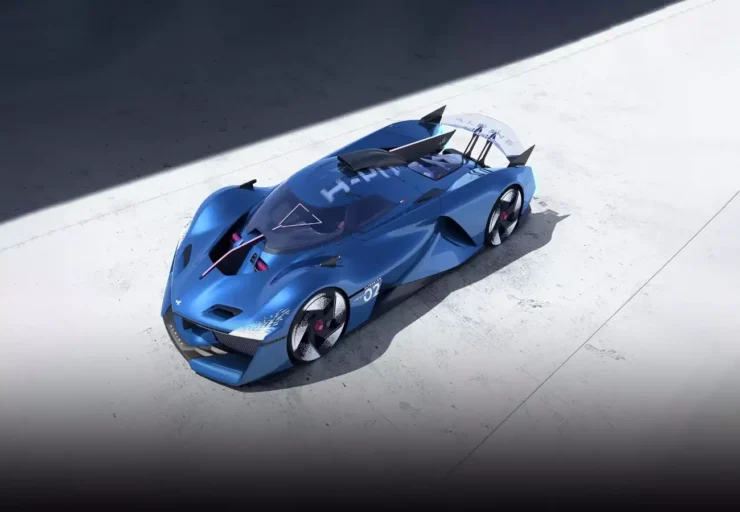




Add comment